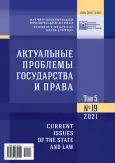Victimological prevention of cyberspace crime
- Authors: Rodina E.A.1,2
-
Affiliations:
- Uryupinsk Interdistrict Prosecutor’s Office of Volgograd Region
- Saratov State Law Academy
- Issue: Vol 5, No 19 (2021)
- Pages: 510-524
- Section: Материальное право
- URL: https://journal-vniispk.ru/2587-9340/article/view/303973
- ID: 303973
Cite item
Abstract
Despite efforts to improve criminal legislation, the number of criminal offenses committed in cyberspace continues to grow. This predetermines the need to improve preventive measures, including victimological ones. Purpose of the work: development of a set of measures for victimological prevention of crimes committed in cyberspace. Among the methods used are the dialectical method of scientific knowledge, systemic, structural, comparative legal, content analysis. Based on the analysis of the reasons for the victimization of users in cyberspace, proposals have been developed for a set of measures for victimological prevention, including improving citizens’ information about security measures, government support for the development of open source software, a ban on government agencies from requiring citizens to submit documents in one format, or using software that can function under only one operating system, the legislative increase in the established period for informing the payment system operator about an unauthorized transfer of funds to 30 days, amending a number of laws aimed at limiting the access of minors to information that could harm their development, changing the procedure for minors' access to information, contained in computer networks on the basis of white lists, the development of a national digital currency and a number of others.
Keywords
About the authors
Ekaterina A. Rodina
Uryupinsk Interdistrict Prosecutor’s Office of Volgograd Region; Saratov State Law Academy
Author for correspondence.
Email: rodina-caterina2010@yandex.ru
ORCID iD: 0000-0003-4651-179X
Assistant to the Uryupinsky Interdistrict Prosecutor of Volgograd Region, Lawyer of the 3rd Class; Post-Graduate Student, Prosecutor’s Supervision and Criminology Department
Russian Federation, 2 Ulyanovsk Ln., Uryupinsk 403113, Volgograd Region, Russian Federation; 1 Volskaya St., Saratov 410056, Russian FederationReferences
- Despite efforts to improve criminal legislation, the number of criminal offenses committed in cyberspace continues to grow. This predetermines the need to improve preventive measures, including victimological ones. Purpose of the work: development of a set of measures for victimological prevention of crimes committed in cyberspace. Among the methods used are the dialectical method of scientific knowledge, systemic, structural, comparative legal, content analysis. Based on the analysis of the reasons for the victimization of users in cyberspace, proposals have been developed for a set of measures for victimological prevention, including improving citizens’ information about security measures, government support for the development of open source software, a ban on government agencies from requiring citizens to submit documents in one format, or using software that can function under only one operating system, the legislative increase in the established period for informing the payment system operator about an unauthorized transfer of funds to 30 days, amending a number of laws aimed at limiting the access of minors to information that could harm their development, changing the procedure for minors' access to information, contained in computer networks on the basis of white lists, the development of a national digital currency and a number of others.
Supplementary files








